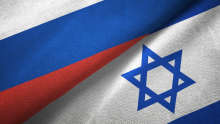Israel-Russia Bilateral relations
Israel-Soviet Union relations began in November 1947 with the Soviet Union's support for the establishment of the State of Israel. The relations were severed by the Soviet Union following the Six-Day War in June 1967 and were renewed in October 1991. With the dissolution of the Soviet Union, diplomatic relations between Israel and Russia were established in December 1991, and they are based on fruitful cooperation in the fields of culture, economy, science, technology, and more. Numerous cultural events, such as joint performances by artists, exhibitions, and festivals, alongside reciprocal visits by the leaders of both countries, have contributed to strengthening and deepening the relations.

November 1947, the USSR voted in favor of the General Assembly Resolution 181 (II), whish was one of the fundamentals of the Jewish State. The Resolution included provisions of the termination of the British Mandate over the Land of Israel and the plan to partition the historic Palestine into two states: one Jewish, one Arab.

May 1948,The Soviet Union recognizes the independence of the State of Israel and in September the Israeli foreign mission was opened in Moscow. Golda Meir was appointed as a Head of the Israeli diplomatic mission in Moscow, and Pavel Yarshov (1914-1981) was appointed as the representative of the USSR to Israel. Both hold the rank of envoy.

June 1954, The Israeli mission in Moscow, and the Soviet mission in Tel Aviv, were upgraded to the status of embassies. Dr. Shmuel Elyashiv became the first Ambassador of Israel to the USSR, and Alexander Abramov became the first Ambassador of the USSR to Israel.

June 1967, The USSR severs diplomatic relations with Israel following the Six-Day War.

In October 1991, the USSR and Israel restored diplomatic relations. On December 13, 1991, Ambassador of the USSR Alexander Bovin presented his credentials to Israeli President Chaim Herzog in Jerusalem. The Soviet anthem was played for the last time in Israel at an official ceremony. However, the new USSR ambassador held this title for one week only, since the Soviet Union ceased to exist. The USSR Ambassador became the Russian Ambassador.

In April 2005, Russian President Vladimir Putin visited Israel. This was the first visit of a Russian leader to Israel. In 2020, President Putin paid another visit to Israel, to attend the 75th anniversary ceremony of the liberation of Auschwitz-Birkenau and International Holocaust Remembrance Day. Vladimir Putin, together with the leaders of other countries, took part in the International Forum “Remembering the Holocaust, Fighting Antisemitism” which took place on January 23 at the Yad Vashem museum in Jerusalem. Before speaking at the forum, the Russian president, together with Prime Minister Benjamin Netanyahu and President Reuven Rivlin, inaugurated the “Candle of Memory” monument in the center of Jerusalem, dedicated to the heroic defenders and residents of Leningrad during the years of the siege.

In 2016, in honor of the 25th anniversary of the restoration of diplomatic relations between our countries, a unique multimedia exhibition "Open a Door to Israel" was held in Moscow, organized by the Israeli Embassy together with the Moscow Government. Prime Minister Benjamin Netanyahu attended the official opening ceremony of the exhibition.

Israeli Prime Minister Benjamin Netanyahu, who visited Russia several times, during a working visit in May 2018, together with Vladimir Putin, attended a military parade on the occasion of the 73rd anniversary of Victory in the second world war.
